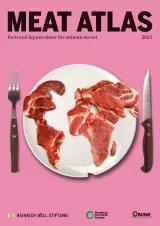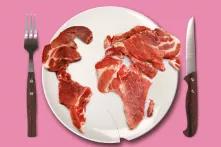
Big Meat attracts big money. Both private and public investors pour money into meat and dairy corporations, further boosting their market power and fuelling yet more consolidation in an already concentrated industry. The environmental and social damage caused by the industry is largely overlooked.

Unlike small producers, industrial meat and dairy corporations operate a lucrative business model. Between 2015 and 2020, global meat and dairy companies received over 478 billion US dollars in backing from 2,500 investment firms, banks, and pension funds around the globe, in the form of loans, underwriting, investment or revolving credit. For comparison: this is more than the 365 billion euros the EU spends on its 7-year Common Agricultural Policy budget.
By buying up smaller companies, large meat and dairy corporations have reduced competition and fuelled their own growth. Yet, hidden behind retail brands, they are largely invisible to the public. In the USA, the four largest corporations – JBS, Tyson, WH Group and Cargill – offer 60 meat-focused brands between them, creating an illusion of choice in a very consolidated market. In the UK, companies such as Cargill and Moy Park supply products sold under brands such as “Willow Farms”, Tesco’s chicken range. Meanwhile, smaller and independent production continues to shrink: since 2007, one-third of small abattoirs in the UK have closed.
Who profits from this consolidation? It varies. For publicly listed companies, market expansion holds the promise of attractive shareholder dividends. But several major meat and dairy companies are privately owned: the family that owns Cargill includes 14 billionaires, collectively receiving around 18 percent of the company’s profits each year. Cargill paid out 1.13 billion dollars to its family owners in July 2020 at the height of the Covid-19 pandemic – at the same time as many workers in meat-processing plants were falling ill from the disease.
The sector gets financial backing in the form of loans, investments, bonds, underwriting, and revolving credit facilities – optional credit that banks extend to companies should they need it. Research by Feedback, a campaign group, found that in April 2020, 3,000 investors provided 228 billion dollars in backing to the 35 largest meat and dairy corporations. In addition to investment, between 2015 and 2020, loans totalling 167 billion dollars flowed from over 200 banks to these companies, with banks based in the USA, France and the UK providing 51 percent of the total credit. These financial flows directly drive climate change: together, the 35 corporations emit more greenhouse gases than the economy of Germany. Thirteen of them also score weakly on the Farm Animal Risk and Return (FAIRR) Index, which analyses protein producers across risks, including human rights, climate impact and antimicrobial resistance.
Assets in the industrial meat and dairy sector present a challenge to investors trying to come to terms with climate risks. The environmental, social, and governance risks associated with JBS, a Brazil based multinational, were enough to prompt Nordea, a Finnish asset manager, to pull its investments out of the company, citing “its ties to farms involved in Amazon deforestation”.
Big Meat and Dairy is not only propped up by vast swathes of private finance. It is also supported by public institutions, including public-sector pension funds and development banks. Local governments across the UK with net zero goals continue to invest in industrial meat and dairy through their pension funds – supporting companies that undermine local, small-scale farming. Despite stringent criteria for safeguarding investments and maintaining environmental and social accountability, multilateral development banks hold direct investments in industrial livestock companies, offer them loans, and provide them with other forms of financial backing.
The European Bank for Reconstruction and Development and the International Finance Corporation – the private-sector arm of the World Bank – have lent 2.6 billion dollars of public money to industrial livestock producers over the past decade. For regional development banks, this trend is even more pronounced. Take the Brazilian development bank BNDES, for example: it is the largest minority shareholder in JBS, which has been accused of trading with ranchers on illegally deforested land and displacing Brazil’s indigenous communities. While the livestock sector receives only 2.5 percent of official development assistance, the scale of public finance available makes these sums equivalent to creating whole megafarms across several continents. This is in direct conflict with these banks’ purpose of promoting the public interest and their commitment to the UN’s Sustainable Development Goals.
While many financiers have made commitments to environmental policies and targets, the impacts of industrial-scale agriculture are yet to be regulated across financial and legal platforms. The Task Force on Climate-Related Financial Disclosures and the Carbon Disclosure Project provide guidelines for financial institutions and companies to disclose their impacts. But such disclosures are neither mandatory nor comprehensive, nor does disclosure necessarily lead to action.
Banks and asset managers continue to finance industrial meat and dairy corporations despite direct contradictions between this support and their alignment with the Sustainable Development Goals, as well as their other environmental, social, and governance commitments. NGOs and some financial institutions and agri-businesses are calling for financiers to be better regulated. In late 2020, EU parliamentarians also called for regulation to govern deforestation and other environmental harms in companies’ supply chains and finance organizations’ investments. The European Commission is now moving towards a strong legislative proposal for this.

